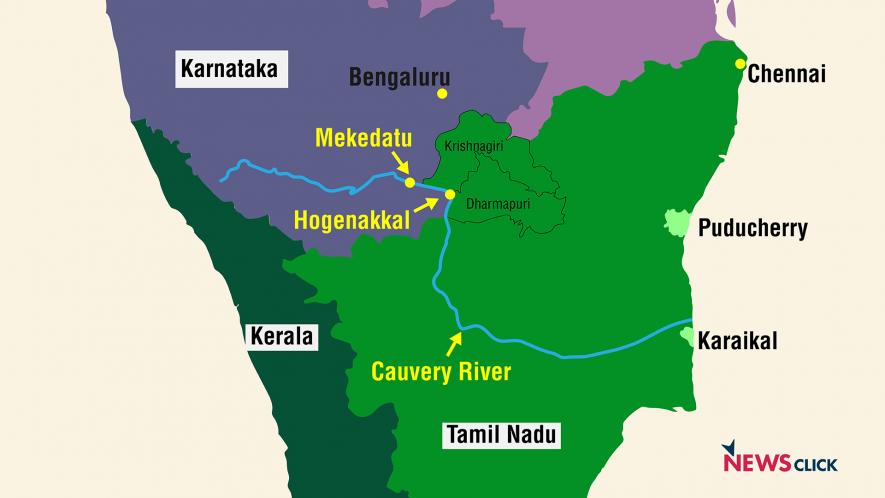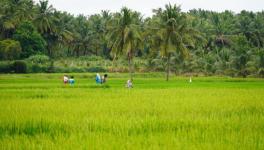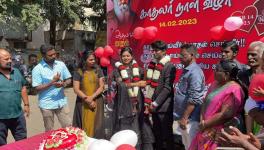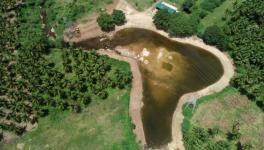Tamil Nadu Hogenakkal Drinking Water Project in Karnataka Troubled Waters
A day after Tamil Nadu chief minister MK Stalin announced the second phase of the Hogenakkal combined drinking water project for Dharmapuri and Krishnagiri districts at an estimated cost of Rs 4,600 crore on January 20, Karnataka minister for water resources Govind M Karjol opposed it saying the Bharatiya Janata Party-ruled state will oppose it.

Karnataka cited two reasons for opposing the project: Tamil Nadu didn’t place the proposal before the Cauvery Water Disputes Tribunal or the Supreme Court and it falls within the geographical jurisdictions of both the states.
In response, Karjol’s counterpart Duraimurugan said that the apex court had ordered Karnataka to daily release 1,000 million cubic feet (tmc ft) water to Tamil Nadu and the state has the right to use it for any purpose as long as it provides 7 tmc ft water to the neighbouring Union Territory of Puducherry.
IS PERMISSION NECESSARY?
Karnataka’s has argued that Tamil Nadu cannot take unilateral decisions on matters related to Cauvery water. “Any project that Tamil Nadu wants to take up in the Cauvery Basin should be in line with the allocation of water made by the Tribunal and Supreme Court orders. But this project has not been placed before the Tribunal or the Supreme Court. So, we will oppose it,” said Karjol.
Janakarajan, former professor at the Madras Institute of Development Studies, Chennai, and an expert on water management told Newsclick that “since there is a Tribunal and the Cauvery Water Management Authority (CWMA), constituted under the instruction of the Supreme Court, it is better for the states to inform these committees if not seek permission”.
“In all probability, the Committee will not object to the project. Even if there is objection, it would likely be for technical reasons. As per the National Water Policy, 2019. drinking water will be given priority,” Janakarajan added.
IS BORDER AREA A REASON?
Opposing the project, Karjol had said that the “Hogenakkal region spans 64 km in the Karnataka-Tamil Nadu border area” and “the Survey of India has not finalised the Karnataka-Tamil Nadu border at Hogenakkal”.
However, Janakarajan said that “even if the proposed project is in the border area, water can only flow downstream and Tamil Nadu is along the downstream of Cauvery river. A water project in Hogenakkal does not affect the water supply in Karnataka in any manner”.
The project intends to supply drinking water to more people in Dharmapuri and Krishnagiri, and facilitate the proposed milk processing unit to fulfil the long-term demand of cattle farmers, which will provide employment to the local youth.
In an indirect reference to Mekedatu Dam, Duraimurugan said, “The Cauvery Water Disputes Tribunal had earmarked water for drinking too.” The dam was proposed to supply sufficient water to meet the ever-growing needs of Bengaluru and its surrounding districts. But the Tamil Nadu government opposed the construction of the reservoir fearing Karnataka will hoard water in the dam thereby cheating it of its share of the Cauvery water.
HOGENAKKAL PROJECT NOT SAME AS MEKEDATU DAM
Both the Hogenakkal project and Mekedatu Dam were proposed to supply drinking water. But Janakarajan says they cannot be compared. “Karnataka plans to construct the dam, which will have the capacity to hold up to 70 tmc ft water. The water supply to Tamil Nadu will surely be affected. Karnataka cannot argue that the dam is necessary only because it supplies drinking water to Bengaluru.”
Karnataka has maintained that it is well within its rights to construct the dam, which falls withing its jurisdiction, as long as Tamil Nadu gets its annual share of water.
Tamil Nadu has argued that as per the Inter-State River Water Disputes Act, Karnataka cannot build the dam without the consent of the lower riparian state. The Stalin government has even questioned the permission given by the Central Water Commission to Karnataka to prepare a detailed project report that has been submitted to the CWMA.
Moreover, the amount of water in question in these two projects is vastly different. “While Mekadatu Dam will have a capacity to store 70 tmc ft water, the Hogenakkal project will supply less than 1 tmc ft for public use, not storage,” Janakarajan said.
Get the latest reports & analysis with people's perspective on Protests, movements & deep analytical videos, discussions of the current affairs in your Telegram app. Subscribe to NewsClick's Telegram channel & get Real-Time updates on stories, as they get published on our website.
























